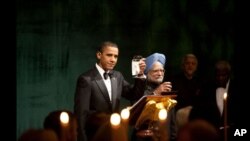President Barack Obama sets off this week (November 5) on a 10 day trip through Asia, starting in India, followed by Indonesia, South Korea and Japan. Mr. Obama will be seeking to move U.S. economic and security ties forward with each country, while sending a message that the United States intends to remain fully engaged in Asia in economic and security terms.
President Barack Obama honored Prime Minister Manmohan Singh last year at the White House with a state dinner, the first of his presidency, and Mr. Singh plans to pay back the favor in New Delhi during Mr. Obama's upcoming visit. Polls shows Mr. Obama is highly popular in India, the world's largest democracy.
India also is a growing economic and strategic power with a burgeoning middle class that has largely escaped the global recession. Ron Sommers of the U.S-India Business Council says President Obama's visit could bring major economic dividends for both countries.
"We need to be creating jobs right now in both countries, in both societies and so the emphasis here is going to be on the two-way highway that is being developed between the U.S. and India in terms of India being one of the fastest emerging markets on Earth," Sommers states.
Deepening U.S.-India economic ties come at a time when India also is looking elsewhere for partners, as part of its "Look East" policy. Prime Minister Singh recently visited Japan, Vietnam and Malaysia.
Walter Andersen is a South Asia specialist at the Johns Hopkins University School of International Studies. He says, "There is a huge potential for foreign direct investment on the part of the Japanese who have not invested much yet, but they are about to invest in a very significant way in India. Then there is also the strategic element because there is concern in Southeast Asia and in Japan about a more assertive Chinese role and they all clearly want a closer relationship with the next big power in Asia which is India."
The bustling commercial center Mumbai is Mr. Obama's first stop. While there, he will meet with Indian and American business executives, honor the victims of the 2008 terrorist attacks and hold a public discussion at a local university. He'll stay at The Taj Hotel, one of the targets of the terrorist attack.
In New Delhi, Mr. Obama plans to address parliament where he is expected to mention the need to achieve final implementation of the U.S.-India civil nuclear accord.
White House officials say Mr. Obama's visit to Indonesia, twice postponed earlier this year, will underscore the archipelago's importance as the world's largest Muslim majority nation and its success as a democracy.
In Jakarta, Mr. Obama plans to visit the Istiqlal Mosque, the largest in Indonesia, but due to a lack of time he will not visit the school he attended in Indonesia as a child, despite its personal significance to him.
Next stop - Seoul, South Korea, where preparations are already underway for the G-20 summit there, the first in an Asian nation. Mr. Obama will then head to Yokohama, Japan for the APEC (Asia Pacific Economic Cooperation) summit.
While in Seoul, Mr. Obama will hold talks for the seventh time with Chinese President Hu Jintao, and meet with U.S. troops to mark the 60th anniversary of the start of the Korean War.
Former U.S. Undersecretary of State for Political Affairs Nicholas Burns argues that the U.S. needs to forge with China the kind of relationship it has with India and other Asian nations to ensure China's continuing rise is peaceful.
"It makes sense that the United States of America should commit itself to a long term strategic partnership, a sort of alliance, with India and Japan and other countries in the future, so that China's rise occurs in a peaceful, stable, Asia where the democratic powers remain very strong," Burns said.
President Obama returns home November 14 to a capital expected to be sharply changed by midterm congressional elections.




